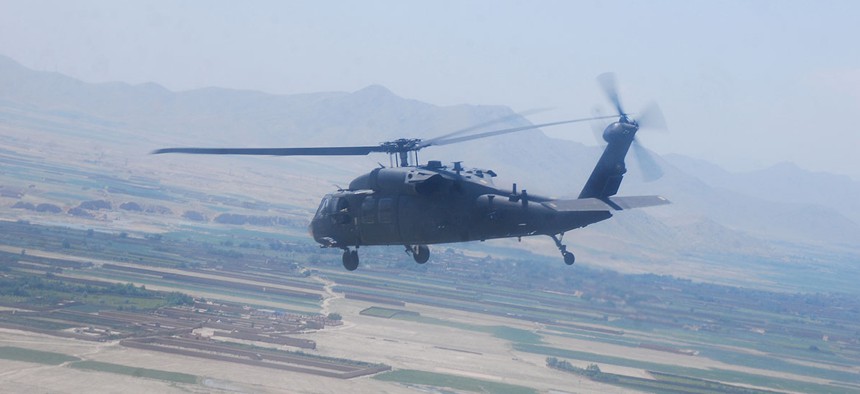
A UH-60 Black Hawk helicopter flies over eastern Afghanistan in 2013. Defense Department file photo
The Defense Department's Afghan Slush Fund Will Answer to Angry Lawmakers Soon
The Pentagon has 48 hours to start handing over the data.
The Department of Defense has refused to answer questions about hundreds of millions of dollars spent by a controversial task force focused on economic redevelopment in US war zones. Now, an exasperated US senator has given the department 48 hours to turn over its files.
The Task Force for Business and Stability Operations (TFBSO) was back in the news last week when an independent inspector general found that it had spent $43 million on a natural gas filling station in Afghanistan, but was unable to justify the huge cost, or even the need for a natural gas station in the first place.
The DOD gave the inspector general an elaborate runaround. Having shuttered the task force mid-review, the DOD said it could not provide auditors access to former personnel—including current DOD employees—and wouldn’t give up files, now archived, because previous documents handed over to the inspector had been obtained by reporters under US freedom of information rules.
Instead, Defense officials set up a reading room for the auditors. But when they visited, the archive’s monitor did not provide any relevant documents. A spokesperson told Quartz the Department of Defense continues “to provide complete and unfettered access to TFBSO documents” for the auditors.
But that answer may not satisfy Congress: Senator Chuck Grassley, the chairman of the Senate Judiciary Committee, told Defense officials in a letter yesterday that their refusal “appears to be a violation of the Inspector General Act” and demanded that all TFBSO records be handed over to his office by November 30th. They also added a request for a specific hard drive to be copied and delivered within 48 hours.
“We have received the correspondence from Senator Grassley and will work that directly with office,” Lieutenant Colonel Joseph Sowers, a Defense spokesperson, told Quartz.
TFBOS has attracted skepticism almost since it was established during the US occupation of Iraq in 2006. The task force, led by Paul Brinkley, a former Silicon Valley executive turned Defense official, was designed to support economic reconstruction in an effort to complement counter-insurgency efforts, with the hope that jobs and opportunity would be a more attractive alternative to taking up arms against the US. Attracting serious investment to war-zones proved no easy task.
Reconstruction efforts were hindered by turf and policy disagreements between the task force, the State Department and US AID, along with allegations of mismanagement and inappropriate behavior by the task force’s leaders as early as 2007. Dreams of US WalMarts stocking Baghdad-made goods quickly fell apart. By 2010, the task force wasoperating in Afghanistan as well with remarkable latitude, but ultimately little to show in the way of results. When Congress decided that US AID would take the lead on economic reconstruction next year, Brinkley and his senior staff resigned.
“We do capitalism. We’re about helping companies make money,” Brinkley told the Washington Post at the time. “That mind-set cannot exist in a humanitarian organization. It’s like asking General Motors to make potato chips.”
Brinkley stepped down two months before the contract for the $43 million natural gas station was awarded in August, 2011. But the controversial gas station isn’t the end of inquiries into the task force’s activities. Auditors are working on a second review of some $488 million committed by the task force and US AID to bolster Afghanistan’s extractive industries, from minerals to natural gas. A first review (pdf) found little planning around the investments or their future, “creating a risk that the data, equipment, and human capital that TFBSO invested in will be squandered.”
The Department of Defense declined Quartz’s request to interview Joseph Catalino, a former senior task force official who now advises the Secretary of Defense on counter-insurgency, or other former TFBSO officials.







